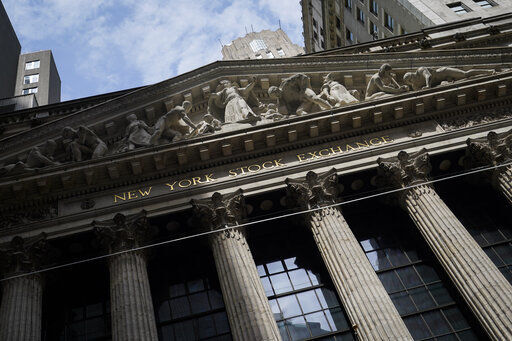NEW YORK — Early gains on Wall Street were doused today after the government reported that surging prices for gas, food and rent catapulted U.S. inflation to a new four-decade peak in June, likely sealing the case for another large interest rate hike by the Federal Reserve.
Futures for the Dow Jones Industrial Average and the S&P 500, which were pointed toward gains just minutes before the release of the report, pivoted sharply lower after the Labor Department’s report showed that consumer prices soared 9.1% compared with a year earlier.
Futures for the Dow Jones Industrial Average tumbled 1.1% and futures for the S&P 500 declined even further at 1.5%.
The jump in consumer prices was the biggest 12-month increase since 1981, and up from an 8.6% jump in May. On a monthly basis, prices rose 1.3% from May to June, another substantial increase, after prices had jumped 1% from April to May.
U.S. inflation has surged as the economy recovered from the coronavirus pandemic and some investors and economists worry that the Fed’s response — a half-point increase to its benchmark rate in May and a three-quarter point increase last month — will cool the economy too fast and send the country into a recession.
Michael Pearce, senior U.S. economist with Capital Economics, expects the Fed to raise its main borrowing rate by another three-quarter point when it meets later this month.
“While some will draw parallels with the shockingly bad May CPI report, the backdrop is markedly different — commodity prices have fallen sharply and we’ve seen clearer signs of an economic slowdown, both of which will contribute to weaker price pressures ahead,” Pearce said.
Russia’s invasion of Ukraine has exacerbated the problem, pushing up prices of oil and other commodities. Global manufacturing supply chains were disrupted by Chinese efforts to contain virus outbreaks that temporarily shut down Shanghai and other industrial centers.
The U.S. bond market is flashing warning signals of a possible recession.
The yield on the 10-year Treasury, or the difference between the market price and the payout at maturity, was at 3.06%. It is just below the two-year Treasury yield, which indicates some investors expect a recession in the next year or two.
In midday trading, the FTSE 100 in London lost 1.2%. The DAX in in Frankfurt sank 1.9% and the CAC 40 in Paris shed 1.8%.
In Asian trading, the Shanghai Composite Index gained less than 0.1% to 3,284.29 after June exports surged 17.9% and imports rose just 1% in a sign of weak demand. Tokyo’s Nikkei 225 added 0.5% to 25,478.77 while the Hang Seng in Hong Kong sank 0.2% to 20,797.95.
The Kospi in Seoul added 0.5% to 2,328.61 after the South Korean central bank raised its policy rate by an unprecedented margin of 0.5 percentage points to 2.25% to cool rising prices.
Sydney’s S&P-ASX 200 gained 0.2% to 6,621.60 and India’s Sensex advanced 0.6% to 53,591.66.
New Zealand advanced after the country’s central bank lifted its benchmark interest rate by half a percentage point to 2.5%. Southeast Asian markets declined.
The S&P 500 lost 0.9% on Tuesday, declining for a third day. Technology, health care and energy stocks accounted for a big share of losses. The Dow Jones Industrial Average slid 0.6% and the Nasdaq composite shed 0.9%.
Big U.S. companies are due to report second-quarter results over the next few weeks.
Expectations appear subdued. Analysts are forecasting 5.1% growth for companies across the S&P 500, which would be the weakest since the end of 2020, according to FactSet.
Shares of Delta Air Lines fell about 3% after the carrier reported early today that it earned $735 million in the second quarter. Earnings per share fell short of Wall Street expectations, which the airline blamed on high fuel prices and more than 4,000 canceled flights in May and June.
“We had a rough six weeks,” CEO Ed Bastian said. “This is a company, this is an industry … none of us were up to our best.”
In energy markets, benchmark U.S. crude lost $1.11 to $94.73 per barrel in electronic trading on the New York Mercantile Exchange. The contract plunged $8.25 on Tuesday to $95.84. Brent crude, the price basis for international trading, fell $1.06 to $98.43 per barrel in London. It fell $7.61 the previous session.
The dollar rose to 137.54 yen from Tuesday’s 136.77 yen. The euro ticked down to $1.0026 from $1.0045.


